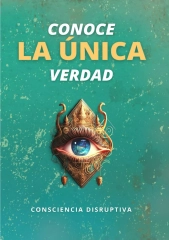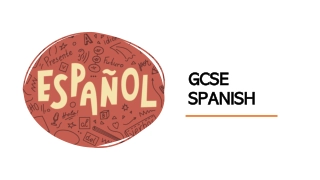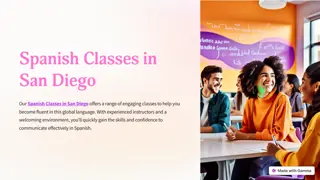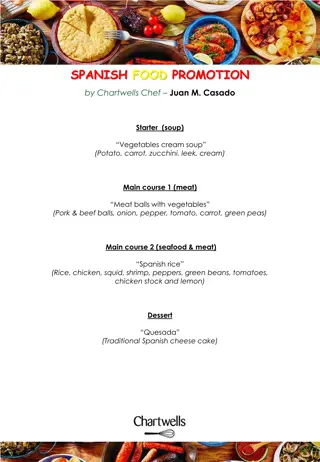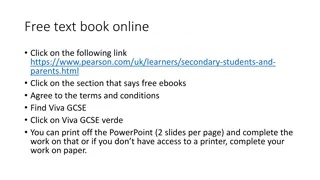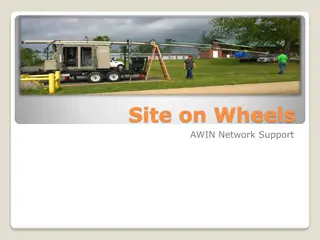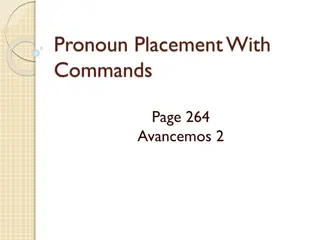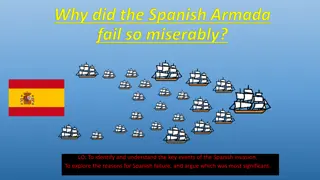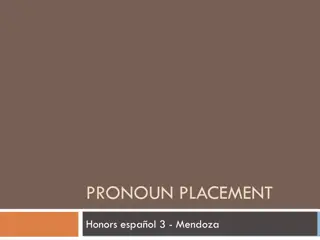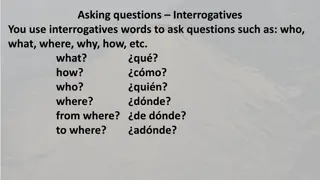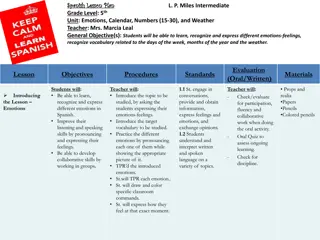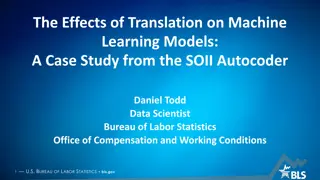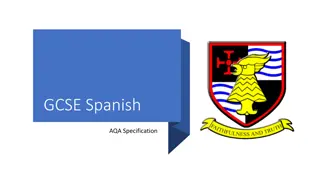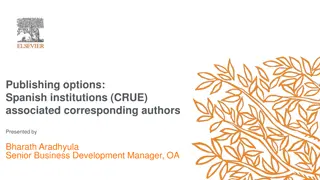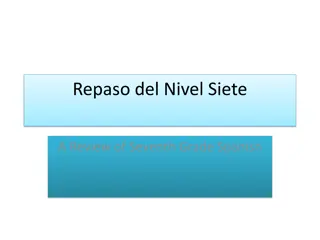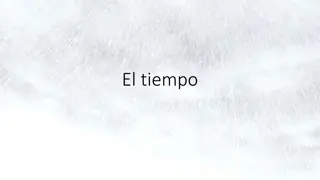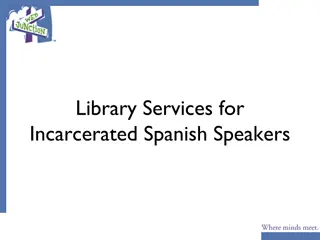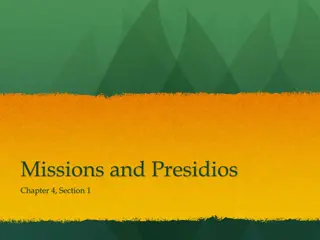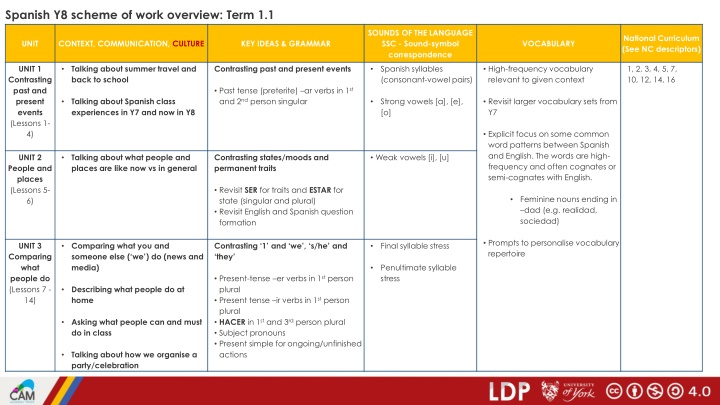
Spanish Y8 Scheme of Work Overview for Term 1
This scheme of work overview for Term 1 covers various topics such as contrasting past and present events, describing people and places, comparing activities, discussing feelings, and exploring different places and actions using the Spanish language. The comprehensive curriculum emphasizes vocabulary, grammar, and communication skills for enhanced language learning in Year 8.
Download Presentation

Please find below an Image/Link to download the presentation.
The content on the website is provided AS IS for your information and personal use only. It may not be sold, licensed, or shared on other websites without obtaining consent from the author. If you encounter any issues during the download, it is possible that the publisher has removed the file from their server.
You are allowed to download the files provided on this website for personal or commercial use, subject to the condition that they are used lawfully. All files are the property of their respective owners.
The content on the website is provided AS IS for your information and personal use only. It may not be sold, licensed, or shared on other websites without obtaining consent from the author.
E N D
Presentation Transcript
Spanish Y8 scheme of work overview: Term 1.1 SOUNDS OF THE LANGUAGE SSC - Sound-symbol correspondence National Curriculum (See NC descriptors) UNIT CONTEXT, COMMUNICATION, CULTURE KEY IDEAS & GRAMMAR VOCABULARY UNIT 1 Contrasting past and present events (Lessons 1- 4) Talking about summer travel and back to school Contrasting past and present events Spanish syllables (consonant-vowel pairs) High-frequency vocabulary relevant to given context 1, 2, 3, 4, 5, 7, 10, 12, 14, 16 Past tense (preterite) ar verbs in 1st and 2ndperson singular Talking about Spanish class experiences in Y7 and now in Y8 Strong vowels [a], [e], [o] Revisit larger vocabulary sets from Y7 Explicit focus on some common word patterns between Spanish and English. The words are high- frequency and often cognates or semi-cognates with English. UNIT 2 People and places (Lessons 5- 6) Talking about what people and places are like now vs in general Contrasting states/moods and permanent traits Weak vowels [i], [u] Revisit SER for traits and ESTAR for state (singular and plural) Revisit English and Spanish question formation Feminine nouns ending in dad (e.g. realidad, sociedad) Prompts to personalise vocabulary repertoire UNIT 3 Comparing what people do (Lessons 7 - 14) Comparing what you and someone else ( we ) do (news and media) Contrasting 1 and we , s/he and they Final syllable stress Penultimate syllable stress Present-tense er verbs in 1stperson plural Present tense ir verbs in 1stperson plural HACER in 1stand 3rdperson plural Subject pronouns Present simple for ongoing/unfinished actions Describing what people do at home Asking what people can and must do in class Talking about how we organise a party/celebration
Spanish Y8 scheme of work overview: Term 1.2 SOUNDS OF THE LANGUAGE SSC - Sound-symbol correspondence National Curriculum (See NC descriptors) UNIT CONTEXT, COMMUNICATION, CULTURE KEY IDEAS & GRAMMAR VOCABULARY UNIT 4 Activities in and out of school (Lessons 15- 18) Talking about activities at school Contrasting past and present events [2] Revisit final syllable stress with er/-ir verbs in the preterite (- ) Consolidation and extension of vocabulary relevant to the given contexts. 1, 2, 3, 4, 5, 6, 7, 10, 12, 14, 15, 16 Talking about free time activities Past tense (preterite) er and ir verbs in 1stand 2ndperson singular Prenominal adjectives Ante-penultimate syllable stress Using de to link nouns (e.g. partido de f tbol) Revisit hard C [CA], [CO], [CU] Use of accent on singular vs plural nouns with final syllable stress Nouns used with IR and DAR in idiomatic ways (e.g. dar una vuelta, ir de paseo) UNIT 5 Describing how people feel (Lessons 19- 22) Talking about feelings and emotions Using TENER to mean be ; using DAR for feelings Prompts to personalise vocabulary repertoire Talking about wanting Revisit TENER use feminine nouns ending in -ci n QUERER and DAR in 1st and 3rdperson plural UNIT 6 Places (Lessons 23 28) Talking about where people go and why Expressing intention with para Talking about present actions (-AR, - ER, -IR regular verbs and IR) Revisit [CU] + vowel Revisit [L] and [LL] Extended Reading: Bolivia un pa s diverso IR in 3rdperson plural Revisit [CE], [CI] Talking about work in a restaurant Para + infinitive Talking about festive traditions at home Revisit regular present tense verbs
Spanish Y8 scheme of work overview: Term 2.1 SOUNDS OF THE LANGUAGE SSC - Sound-symbol correspondence National Curriculum (See NC descriptors) UNIT CONTEXT, COMMUNICATION, CULTURE KEY IDEAS & GRAMMAR VOCABULARY UNIT 7 Activities past and present (Lessons 29- 34) Talking about socialising (on and offline) Contrasting past and present events [3] Revisit [z] [ce] [ci] Revisit question words 1, 2, 3, 4, 5, 7, 10, 12, 14, 16 Revisit [que], [qui] Revisit high-frequency regular ar/-er/-ir verbs in new contexts. Talking about travel (el santuario de las Lajas) Past tense (preterite) ar verbs in 3rd person singular Developing the verb lexicon (-ar/-er/-ir verbs) Talking about community activities (e.g., to help the environment) Past tense (preterite) er and ir verbs in 3rdperson singular Learn new meanings of the verbs sacar , conocer, querer UNIT 8 Talking about what you do to or for others Talking about actions directed towards others or yourself Revisit [ga] [go] [gu] Relationships and daily life Revisit [ge] [gi] [j] Talking about daily routine (un desayuno t pico) Personal a (Lessons 35 - 38) Reflexive me and te Revisit possessive adjectives mi , tu Assessment: 1st half spring term (Week 2.1.4). Separate phonics, vocabulary and grammar assessments. Total assessment time: 35 minutes.
Spanish Y8 scheme of work overview: Term 2.2 SOUNDS OF THE LANGUAGE SSC - Sound-symbol correspondence National Curriculum (See NC descriptors) UNIT CONTEXT, COMMUNICATION, CULTURE KEY IDEAS & GRAMMAR VOCABULARY UNIT 9 Friendships & birthday celebrations (Lessons 39 - 42) Talking about who does what a criminal and a detective a girl and her dog Using Object-Verb-Subject word order to refer to it , me , you , him , her. Contrast [n] and [ ] Deepen vocabulary and grammar knowledge through work with a challenging text. 1, 2, 3, 4, 5, 7, 10, 12, 14, 16 Revisit [v] and [b] OVS word order Talking about birthdays in general and a past birthday Develop knowledge of words from a range of word classes Direct object pronouns lo , la Consolidate previously taught vocabulary by using them for further practice of sound-symbol correspondences Continue to focus on personalising voabulary UNIT 10 Opinions and feelings Talking about how we and others feel about things Using Object-Verb-Subject word order with GUSTAR-type verbs to express likes and give opinions Revisit [r] and [rr], including the pronunciation of [r] in word-initial position Giving opinions about school (Lessons 43 - - 48) Indirect object pronouns (me, te, le) Extended reading Ayamam (a traditional Amazonian folk story) Revisit silent [h] Gustar-type verbs Revisit several SSCs
Spanish Y8 scheme of work overview: Term 3.1 SOUNDS OF THE LANGUAGE SSC - Sound-symbol correspondence National Curriculum (See NC descriptors) UNIT CONTEXT, COMMUNICATION, CULTURE KEY IDEAS & GRAMMAR VOCABULARY UNIT 11 Visit to a Spanish city (Lessons 49- 50) Talking about visiting Santa Cruz, Tenerife Talking about actions in the present Revisit several SSCs Extend knowledge of numbers (21-30) 1, 2, 3, 4, 5, 7, 10, 12, 14, 16 Revisit SER (es, son), adjective agreement, para + infinitive Consolidate knowledge of adjectives by learning to use them in comparisons UNIT 12 Family and friends Talking about family members and their jobs Describing an outing to a music festival with family and friends Shopping with friends Comparing how people are and feel, and comparing things Spelling changes with ar verbs in 1st person past (preterite) (-qu , - gu ) Possessive adjectives su and nuestro Comparatives m s and menos Adjectives with comparative meaning Demonstratives este , esta , estos , estas (Lessons 51- 56) revisit strong vowels [a], [e], [o] revisit weak vowels [i], [u] UNIT 13 Weekend activities and holidays (Lessons 57 - 60) Talking about what sporting activities you do and did Contrasting past and present actions revisit final syllable stress (including regular verbs in the preterite) HACER in past (preterite) in singular persons Talking about other weekend activities IR in past (preterite) in singular persons Talking about travel to different countries and cities (Medell n, Colombia)
Spanish Y8 scheme of work overview: Term 3.2 SOUNDS OF THE LANGUAGE SSC - Sound-symbol correspondence National Curriculum (See NC descriptors) UNIT CONTEXT, COMMUNICATION, CULTURE KEY IDEAS & GRAMMAR VOCABULARY UNIT 14 Asking questions (Lessons 61 - 64) Asking and answering questions about a past trip (Gij n) Asking questions about past and present events Revisit penultimate syllable stress Revisit a range of vocabulary from Year 7 1, 2, 3, 4, 5, 7, 10, 12, 14, 16 Talking about the lives of famous Spanish-speaking people Revisit regular (-ar, -er, -ir verbs) in singular persons in past Deepen vocabulary and grammar knowledge through work with a challenging text. Asking and answering questions about school and the Spanish school system Talking about exercise and fitness Revisit regular (-ar, -er, -ir verbs) in plural persons in present Personalise own vocabulary UNIT 15 What is happening now (Lessons 65- 68) Describing what is happening right now Revisit ante-penultimate syllable stress Talking about making a film Present continuous with ar verbs Present continuous with ir/-er verbs UNIT 16 Past and future trips to Spain and Spanish festivals (Lessons 69 - 72) Extended reading La Tomatina festival Talking about past events and future plans Revisit spelling changes qu and gu in the preterite Describing a past trip (Palma de Mallorca) HACER in past (preterite) in singular persons (revisited) Revisit several SSCs Talking about a future trip IR in past (preterite) in singular persons (revisited) Revisit future plans with IR [revisited] Assessment: Week 3.2.3 Separate phonics, vocabulary and grammar achievement tests. [45 minutes]. Proficiency tests [L,R,W,S]. [45 minutes]
KS3 Languages National Curriculum and Knowledge strands matrix National Curriculum objectives Pupils should be taught to: NC no. Knowledge Strands Modes and modalities Recognition & Production (Sound to print L & W) Recognition & Production (Print to sound R & S) transcribe words and short sentences that they hear with increasing accuracy. 1 Phonics speak coherently and confidently, with increasingly accurate pronunciation and intonation. 2 3 4 listen to a variety of forms of spoken language to obtain information and respond appropriately. read and show comprehension of original and adapted materials from a range of different sources, understanding the purpose, important ideas and details, and provide an accurate English translation of short, suitable material. read literary texts in the language [such as stories, songs, poems and letters], to stimulate ideas, develop creative expression and expand understanding of the language and culture. initiate and develop conversations, coping with unfamiliar language and unexpected responses, making use of important social conventions such as formal modes of address develop and use a wide-ranging and deepening vocabulary that goes beyond their immediate needs and interests, allowing them to give and justify opinions and take part in discussion about wider issues identify and use tenses or other structures which convey the present, past, and future as appropriate to the language being studied. use and manipulate a variety of key grammatical structures and patterns, including voices and moods, as appropriate. Understanding (Aural (L) / Written (R)) Vocabulary 5 6 7 Production 8 (Oral (S) / Written (W)) 9 Understanding (Aural (L) / Written (R)) 10 11 identify and use tenses or other structures which convey the present, past, and future as appropriate to the language being studied. use and manipulate a variety of key grammatical structures and patterns, including voices and moods, as appropriate. express and develop ideas clearly and with increasing accuracy, both orally and in writing use accurate grammar, spelling and punctuation. write prose using an increasingly wide range of grammar and vocabulary, write creatively to express their own ideas and opinions, and translate short written text accurately into the foreign language. Grammar 12 Production 13 (Oral (S) / Written (W)) 14 15 16

